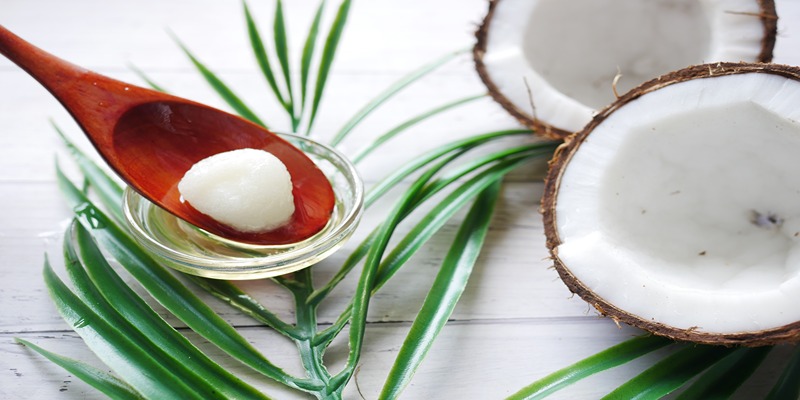After a brief stint on the periphery, coconut oil has become an indispensable component in many modern kitchens and beauty routines. Its many health advantages and delicious tropical taste have earned it widespread acclaim since its extraction from ripe coconuts began. The distinctive combination of fatty acids and nutrients in this oil has led to its use into a wide range of culinary and cosmetic uses. Coconut oil is an attractive topic in the fields of nutrition and natural wellness, captivating both health enthusiasts and academics with its combination of ancient usage and current health discoveries.

Coconut Oil Health Benefits: A Closer Look
Cardiovascular Health and Cholesterol Management
Coconut oil's role in promoting heart health and lowering cholesterol levels is multifaceted. The main kind of saturated fat, lauric acid, is believed to have no effect on heart health whatsoever, albeit it is still rather saturated. Coconut oil may improve heart health by increasing levels of good (HDL) cholesterol, according to some research. Caution is advised since it has the potential to increase levels of LDL (bad) cholesterol. Incorporating coconut oil into a healthy diet may help lower cardiovascular risk factors due to its unique fatty acid composition.
Weight Management and Metabolic Benefits
Coconut oil's medium-chain triglycerides (MCTs) may help with metabolism and weight loss since they are digested differently than other fats. A higher metabolic rate may be possible as a result of the direct transfer of MCTs to the liver for energy conversion. If this method is used to replace long-chain fats in the diet, it may aid in the reduction of body weight and waist circumference. In addition, MCTs may help with weight control by making you feel full on less calories.
Skin and Hair Health Enhancement
A lot of people use coconut oil because of how good it is for their hair and skin. It is a powerful component in skincare products and a great natural treatment for dry skin due to its hydrating characteristics. By fortifying the skin's lipid barrier, the fatty acids in the oil improve the skin's moisture and flexibility. Coconut oil has several great uses for hair, including nourishing and strengthening strands, preventing protein loss, and adding a natural shine. For better skin and hair health in general, it is a popular option for treating a variety of skin diseases and scalp concerns due to its antibacterial and antifungal characteristics.
Nutritional Facts of Coconut Oil: Understanding Its Composition
Fatty Acid Profile of Coconut Oil
Coconut oil has unique health advantages due to its fatty acid composition. Saturated fats make up the bulk of it, with lauric acid being the most abundant. About 40% of coconut oil is lauric acid, which may have some positive effects on health. Its ability to increase blood levels of HDL (good) cholesterol and its antibacterial characteristics have made it famous.
Vitamins, Minerals, and Antioxidant Content
Iron, vitamin K, and vitamin E are just a few of the vital nutrients found in minute levels in coconut oil. Using coconut oil in cooking or adding it to other foods increases total nutritional consumption, even if these amounts are not substantial. Coconut oil may provide health advantages due to its antioxidant content, which helps the body fight oxidative stress.
The Role of Medium-Chain Triglycerides (MCTs)
Coconut oil's distinctive medium-chain triglycerides (MCTs) contribute to its unique health benefits. Medium-chain triglycerides (MCTs) provide a fast energy source since they are readily absorbed and processed by the body. Because they boost satiety and energy expenditure, they have been investigated for their possible function in weight control. Fat malabsorption is another medical ailment that MCTs are used to treat.

Coconut Oil Uses: Culinary and Beyond
Coconut Oil in Cooking and Baking
Coconut oil is a favorite among cooks and bakers due to its adaptability in the kitchen. It is able to resist high temperatures without decomposing or releasing toxic substances because to its high smoke point, which is around 350°F, or 175°C. It may be roasted, sautéed, or fried because of this. Coconut oil is a tasty alternative to traditional cooking oils, and it also gives food a rich, tropical taste.
Coconut oil has several uses in baking, including improving the flavor and texture of baked items. It may be used as a substitute for butter or other fats in recipes, giving baked goods like muffins, cakes, and cookies a distinctive coconut taste and more moisture. It is perfect for making pastry dough and flaky pie crusts since it solidifies at room temperature.
Therapeutic and Cosmetic Applications
Coconut oil is not only used in cooking, but also in many cosmetic and medicinal products. Because of its all-natural composition, it is an excellent multipurpose skincare product that can be used for moisturizing, removing makeup, and nourishing the lips. Many skin issues, such as eczema and acne, may be helped by coconut oil's antifungal and antibacterial characteristics.
Coconut oil is well-known in the hair care industry for its many beneficial properties, including its capacity to increase manageability, gloss, and nutrient retention while decreasing protein loss. A lot of people use it as a conditioner or hair mask. Furthermore, oil pulling, an old method of oral care that may help with better dental health, is a common practice, and coconut oil is a common option for it.
Debunking Myths: Clarifying Misconceptions About Coconut Oil
There are a lot of myths about coconut oil that have developed throughout time. Because of its high saturated fat content, coconut oil is often believed to be harmful. While saturated fats in general are bad for you, the lauric acid and other saturated fats found in coconut oil may not be as bad. Also, while coconut oil is high in calories, it may still be a healthy component of a balanced diet in moderation.
The idea that coconut oil will magically treat any and all health problems is another common fallacy. The many health advantages it provides should not be mistaken for a substitute for professional medical care. By debunking these misconceptions, we can empower people to make well-informed choices about how coconut oil may enrich their lives.

Can Laundry Methods Sabotage the Skin
Dec 06, 2023

Comprehensive Guide to Carbohydrates
Jan 02, 2024

Must-know Butter Nutritional Facts and Its Surprising Benefits
Dec 24, 2023

Unveiling the Nutritional Marvels of Brussels Sprouts
Dec 17, 2023

Attain Your Skincare and Haircare Goals with Cold-Pressed Coconut Oil
Jan 03, 2024

Unveiling the Mystery: 13 Little-Known Facts About Chronic Pain
Oct 27, 2023

Why Kelp Deserves a Spot in Your Kitchen: Top 8 Health Benefits
Jan 08, 2024

Understanding Scalp Sensitivity
Dec 31, 2023



